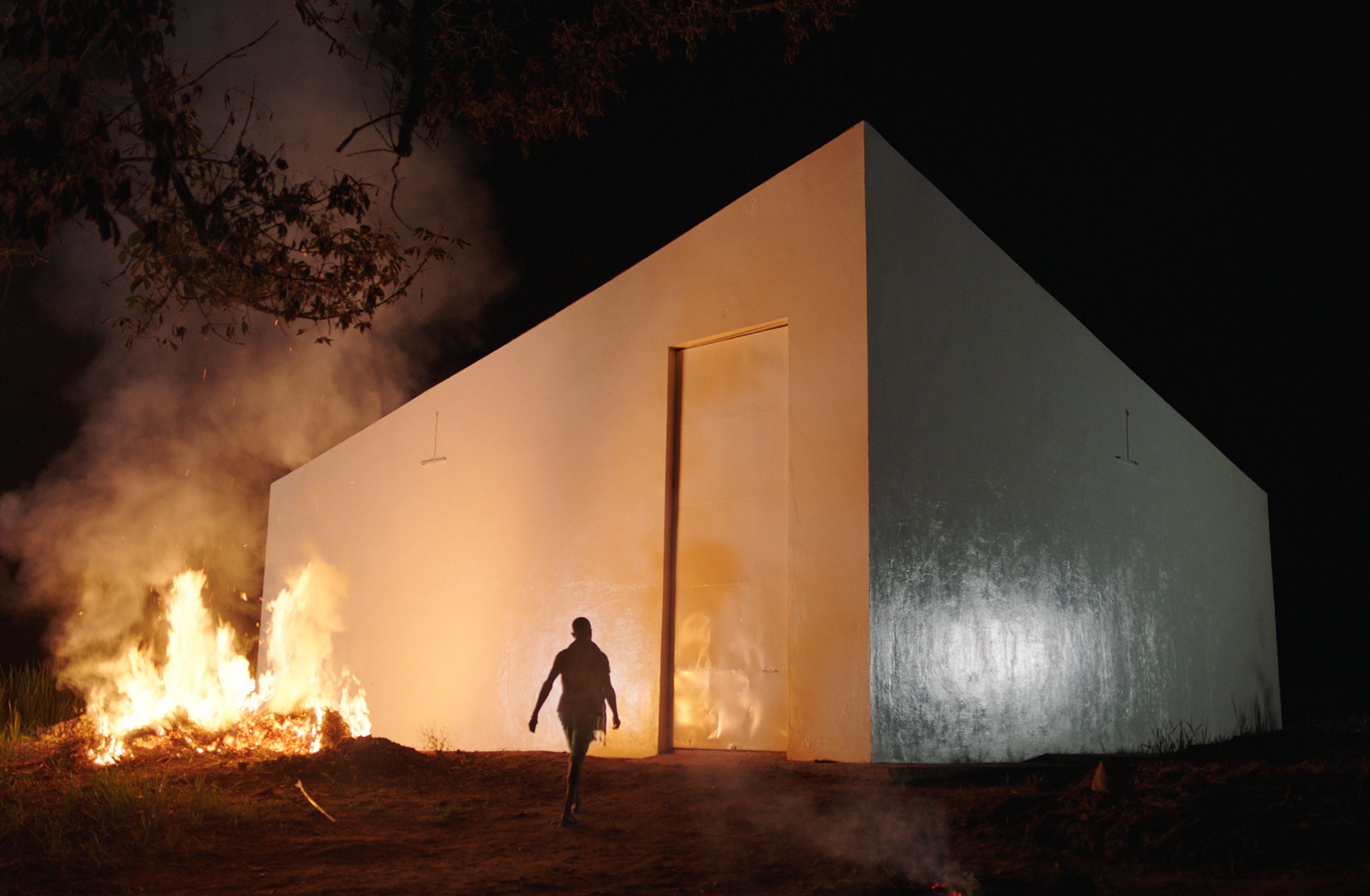

Overview
Sharjah Art Foundation and The Africa Institute will co-host the Middle East premiere of White Cube (2020), a feature-length film that documents the successful attempt by Congolese workers on a former Unilever palm oil plantation to co-opt the ‘white cube’ as a way to buy back their land and secure it for future generations. Taking place on Saturday, 17 April 2021, the event includes the online film screening followed by discussions with the director and scholars about the implications of the project.
The two institutions will be joining the Global Museum Launch event, running from 24 March to 24 April, and including more than 15 participating institutions, during which the film will be projected daily onto the walls of the White Cube, an art museum designed by OMA/David Gianotten and built by the workers on their land in Lusanga, Democratic Republic of the Congo (DRC). Participating institutions include National Museum (Kinshasa); Sharjah Art Foundation, The Africa Institute (Sharjah); KW Institute for Contemporary Art (Berlin); SCCA (Tamale); African Artists’ Foundation (Lagos); V-A-C (Moscow); Van Abbemuseum (Eindhoven); Wiels (Brussels); ICA (London); Mori Art Museum (Tokyo); Picha (Lubumbashi); MPavilion (Melbourne); Museum MACAN (Jakarta); and White Cube (Lusanga).
Directed by Renzo Martens in collaboration with the cooperative Cercle d’Art des Travailleurs de Plantation Congolaise (CATPC), White Cube follows the workers as they form the cooperative with renowned environmental activist René Ngongo, the founder of Greenpeace Congo, in an effort that leads to exhibitions of their artworks at international institutions. In some cases, these institutions have been financed by the very multinational corporations responsible for the ongoing exploitation of the plantation workers and the destructive monoculture that depleted their land. With the income generated from the sales of their art, the workers are able to buy back the land that had been confiscated and taken from them by Unilever, and are now transforming it back into rich and diverse, ecological and egalitarian gardens: the post-plantation. The film is a powerful and provocative dissection of art, class and decolonisation.
Screening and Online Discussion Information
The film will be available to stream here on 17 April 2021 at 8:00 pm Gulf Standard Time (GST), followed by a discussion at 9:30 pm GST. The film can also be streamed on demand from 17 to 24 April for a fee of USD 5 on this link. The proceeds from the VOD are returned to CAPTC who will use the funds to buy back more land.
Following the free screening on 17 April 2021, there will be a discussion that addresses some of the key issues and implications of the project and film. The speakers include Renzo Martens, director of White Cube and Artistic Director of the Institute for Human Activities; Ced’art Tamasala, artist and member of the Cercle d'Art des Travailleurs de Plantation Congolaise (CATPC) and Surafel Wondimu, Okwui Enwezor Postdoctoral Fellow in Visual Culture, Performance Studies and Critical Humanities at The Africa Institute, who will also moderate this discussion.
The discussion will take place via Zoom. Attendees can register for the film and talk via this link. The discussion will be held in English and French and simultaneous translation into Arabic and English will be provided. The discussion will also be recorded and published on the Sharjah Art Foundation website at a later date.
Visit sharjahart.org to learn more.
About Sharjah Art Foundation
Sharjah Art Foundation is an advocate, catalyst and producer of contemporary art. Through the Sharjah Biennial, the annual March Meeting, year-round exhibitions, film and music programmes, education and community outreach programmes, grants, residencies, commissions and publications, the Foundation encourages a shared understanding of the transformational role of art.
About The Africa Institute
The Africa Institute is an interdisciplinary academic research institute dedicated to the study, research and documentation of Africa, its people and its cultures, its complex past, present and future, and its manifold connections with the wider world. Conceived as a research-based think tank, and a postgraduate studies institution (offering both Masters and PhD programmes, and Diplomas in African languages), the Institute aims to train a new generation of critical thinkers in African and African diaspora studies.
About Sharjah
Sharjah is the third largest of the seven United Arab Emirates and the only one bridging the Arabian Gulf and the Gulf of Oman. Reflecting the deep commitment to the arts, architectural preservation and cultural education embraced by its ruler, Sheikh Dr Sultan bin Mohammed Al Qasimi, Sharjah is home to more than 20 museums and has long been known as the cultural hub of the United Arab Emirates. It was named UNESCO's Arab Capital of Culture in 1998 and the UNESCO World Book Capital in 2019.
Media Contact
Alyazeyah Al Reyaysa
+971(0)65444113
alyazeyah@sharjahart.org
